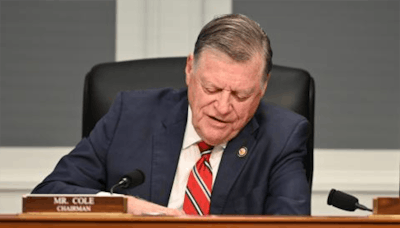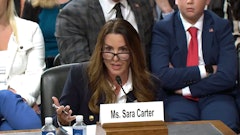
A month after President Donald Trump confirmed that his administration is considering rescheduling cannabis to a less restrictive federal status, his GOP counterparts in the U.S. House are now attempting to strip those executive powers.
The Republican-controlled House Appropriations Committee advanced a federal funding package—the fiscal year 2026 Commerce, Justice, Science (CJS) and Related Agencies appropriations bill—via a 34-28 vote on Sept. 10.
The 154-page legislation, in part, would prevent the Department of Justice (DOJ) from using federal funds to remove cannabis from its Schedule I status under the Controlled Substances Act (CSA), where it’s currently listed alongside heroin, LSD and ecstasy as having no currently accepted medical use. Schedule I substances have the highest potential for abuse and dependence in the eyes of the federal government. Alcohol and tobacco are not listed on any of the five schedules.
“None of the funds appropriated or otherwise made available by this Act may be used to reschedule marijuana … or to remove marijuana from the schedules established under section 202 of the Controlled Substances Act (21 U.S.C. 812),” the legislation states.
In other words, the bill would reserve cannabis rescheduling rights exclusively for the legislative branch of government. Currently on the table in Congress, the Marijuana Opportunity, Reinvestment and Expungement (MORE) Act, sponsored by Rep. Jerry Nadler, D-N.Y., would remove cannabis from the CSA entirely; however, many view the partisan legislation dead on arrival.
This CJS appropriation bill’s advancement on Wednesday comes after Trump told reporters during a White House press briefing on Aug. 11 that he is “looking at” a cannabis rescheduling proposal initiated under President Joe Biden, and that his administration will decide the matter “over the next few weeks.”
“Some people like it. Some people hate it,” Trump said. “Some people hate the whole concept of marijuana because it does bad for the children; it does bad for people that are older than children. But we’re looking at reclassification, and we’ll make a determination …and that determination hopefully will be the right one.”
The current proposed rule to reclassify cannabis to a Schedule III substance involves an administrative process under the DOJ. While Trump can’t unilaterally reschedule cannabis, he can direct Attorney General Pam Bondi or Drug Enforcement Administration (DEA) Administrator Terry Cole to do so.
Traditionally, the DEA has taken the lead on scheduling, rescheduling or descheduling substances under the CSA, an authority delegated to the agency by the attorney general. However, some argue that former Attorney General Merrick Garland un-delegated the DEA’s authority to issue a final rule on the current cannabis rescheduling proposal.
Either way, the DEA operates under the DOJ, which House lawmakers are now attempting to prevent from using funds to take reformative action on cannabis.
The CJS and Related Agencies bill includes roughly $76.8 billion in discretionary allocations, nearly half of which is for the DOJ: $37.3 billion. The bill also provides annual appropriations for the Department of Commerce, the National Aeronautics and Space Administration (NASA) and other federal agencies. The total discretionary amount represents a 2.8% decrease from fiscal 2025 in a move by House Republicans to “right-size” federal government agencies.
Also under the CJS package, the House Appropriations Committee is directing the DOJ to investigate potential money laundering schemes involving Chinese Communist Party-connected marijuana businesses, as well as entities providing financial services to these businesses, according to a committee report on the bill.
In addition, the legislation retains an 11-year-old funding restriction on the DOJ that prohibits federal officials from preventing certain states and U.S. territories from implementing their own laws that authorize the use, distribution, possession or cultivation of medical cannabis. Specifically, the legislation omits these protections for Idaho, Kansas, Nebraska and American Samoa—the three states and one U.S. territory where cannabis remains completely illegal.
However, that long-standing provision in the legislation provides an exception for the DOJ to enforce federal law prohibiting the distribution or manufacturing of a controlled substance near schools and colleges. State-sanctioned cannabis programs already prohibit businesses from operating in close proximity to schools, day cares, churches and other places.
In addition to the cannabis-related provisions, the CJS appropriations bill directs funding to fight the fentanyl crisis, support state and local law enforcement, and counter the Communist Republic of China, according to the GOP majority committee members.
House Appropriations Committee Chairman Tom Cole, R-Okla., said the bill puts security, accountability and national strength at the forefront.
“The FY26 CJS bill is about protecting the nation on every front—safeguarding our streets, restoring fiscal discipline, defending constitutional freedoms and renewing public trust in government,” he said in a press release. “It invests in law enforcement to combat crime and fentanyl, while standing firm against Communist China’s theft of American technology and innovation. It also advances U.S. leadership in space exploration and scientific discovery. At its core, this bill reflects the enduring promise of our nation: safety at home, economic strength and competitiveness, and liberty for every American.”
The partisan committee vote, however, reflected Democratic pushback on multiple fronts, from the legislation’s inclusion of several Trump administration priorities and mandates, such as ending diversity, equity and inclusion (DEI) programs, to funding cuts from current CJS levels.
Rep. Grace Meng, D-N.Y., said the legislation continues to lead on the wrong track as American families struggle.
“This bill sharply cuts funding for the agencies and programs that create jobs, boost American small businesses and advance our economy,” Meng said. “Economic Development Administration grants are cut by 36 percent, abandoning rural and distressed communities that are desperately in need of economic investment and well-paying jobs.”
Meng also pointed to funding slashes for the Minority Business Development Agency, the International Trade Administration, the Federal Bureau of Investigation, and other agencies.
While the House Appropriations Committee also included the cannabis rescheduling language in the FY2025 CJS bill last year, that provision was ultimately omitted from the final version of the bill.



























